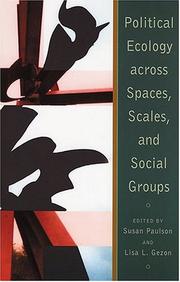| Listing 1 - 4 of 4 |
Sort by
|
Book
ISBN: 1118278755 1118278771 1283804026 1118278763 Year: 2013 Publisher: Chichester ; Malden, Mass. : John Wiley & Sons,
Abstract | Keywords | Export | Availability | Bookmark
 Loading...
Loading...Choose an application
- Reference Manager
- EndNote
- RefWorks (Direct export to RefWorks)
Through original research conducted in the Outer Hebrides, Scotland, Places of Possibility shows how community land ownership can open up the political, social, environmental, and economic terrain to more socially just and sustainable possibilities than private ownership.Reveals how community land ownership is more just and sustainable than private ownershipFeatures original theoretical insights into ideas of property and nature that disrupt the process of neoliberalisationBased on original research conducted by the author in the Outer Hebrides, Scotland
Land reform --- Land tenure --- Commons --- Right of property

ISBN: 0415069912 Year: 1991 Publisher: London New York Routledge
Abstract | Keywords | Export | Availability | Bookmark
 Loading...
Loading...Choose an application
- Reference Manager
- EndNote
- RefWorks (Direct export to RefWorks)
Economic geography --- Third World: economic development problems --- Sub-Saharan Africa --- Community organization --- Cooperative societies --- Rural development --- Africa [Sub-Saharan ] --- Case studies --- Rural development - Africa, Sub-Saharan - Case studies. --- Community organization - Africa, Sub-Saharan - Case studies. --- Cooperative societies - Africa, Sub-Saharan - Case studies. --- Developing countries: economic development problems


ISBN: 1283591979 9786613904423 0813542545 9780813542546 0813534771 9780813534770 081353478X 9780813534787 Year: 2004 Publisher: New Brunswick, NJ
Abstract | Keywords | Export | Availability | Bookmark
 Loading...
Loading...Choose an application
- Reference Manager
- EndNote
- RefWorks (Direct export to RefWorks)
Environmental issues have become increasingly prominent in local struggles, national debates, and international policies. In response, scholars are paying more attention to conventional politics and to more broadly defined relations of power and difference in the interactions between human groups and their biophysical environments. Such issues are at the heart of the relatively new interdisciplinary field of political ecology, forged at the intersection of political economy and cultural ecology. This volume provides a toolkit of vital concepts and a set of research models and analytic frameworks for researchers at all levels. The two opening chapters trace rich traditions of thought and practice that inform current approaches to political ecology. They point to the entangled relationship between humans, politics, economies, and environments at the dawn of the twenty-first century and address challenges that scholars face in navigating the blurring boundaries among relevant fields of enquiry. The twelve case studies that follow demonstrate ways that culture and politics serve to mediate human-environmental relationships in specific ecological and geographical contexts. Taken together, they describe uses of and conflicts over resources including land, water, soil, trees, biodiversity, money, knowledge, and information; they exemplify wide-ranging ecological settings including deserts, coasts, rainforests, high mountains, and modern cities; and they explore sites located around the world, from Canada to Tonga and cyberspace.
Political ecology --- Social ecology --- Green movement --- Case studies.


ISBN: 9780813542546 9780813534770 Year: 2004 Publisher: New Brunswick, N.J. Rutgers University Press
Abstract | Keywords | Export | Availability | Bookmark
 Loading...
Loading...Choose an application
- Reference Manager
- EndNote
- RefWorks (Direct export to RefWorks)
| Listing 1 - 4 of 4 |
Sort by
|

 Search
Search Feedback
Feedback About UniCat
About UniCat  Help
Help News
News